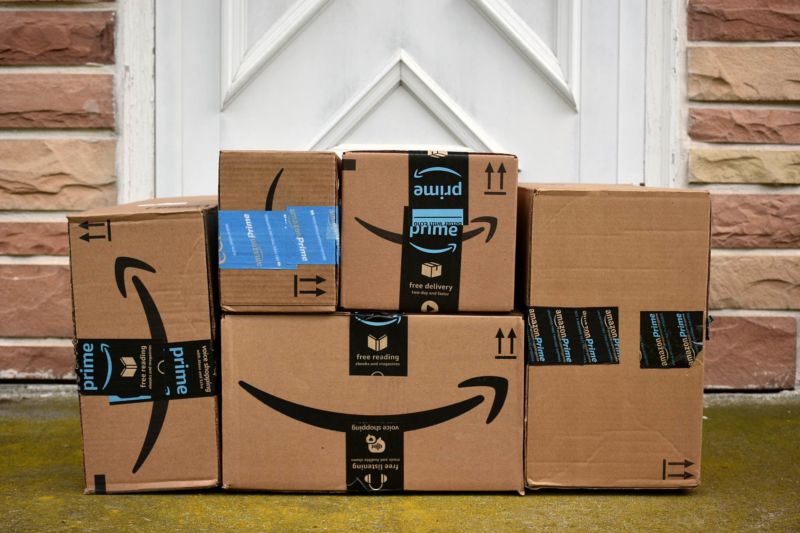Amazon prices —
DC AG: “Amazon fixed online retail prices through contract provisions and policies.”
Jon Brodkin
–

Enlarge / Amazon boxes.
The District of Columbia sued Amazon Tuesday, alleging that the online retail giant violated antitrust law with policies that prevent sellers from offering products at lower prices on other websites.
“Amazon fixed online retail prices through contract provisions and policies” that “prevent third-party sellers that offer products on Amazon.com from offering their products at lower prices or on better terms on any other online platform, including their own websites,” Attorney General Karl Racine’s office said in an announcement of the lawsuit. The complaint was filed in the District of Columbia Superior Court.
Amazon’s most-favored nation (MFN) agreements “effectively require third-party sellers to incorporate the high fees charged by Amazon—as much as 40 percent of the total product price—not only into the price charged to customers on Amazon’s platform but also on any other online retail platform,” Racine’s announcement said. “As a result, these agreements impose an artificially high price floor across the online retail marketplace and allow Amazon to build and maintain monopoly power in violation of the District of Columbia’s Antitrust Act.”
The lawsuit asks for a judgment stating “that Amazon’s actions constitute unreasonable and unlawful restraints of trade” and “that Amazon acted unlawfully to maintain or attempt to achieve a monopoly in the online retail sales market in the United States.” The complaint seeks an injunction prohibiting Amazon from continuing the allegedly anticompetitive practices described in the lawsuit, along with civil penalties, attorneys’ fees, and “restitution and damages for harmed consumers.”
Amazon says DC “has it exactly backwards”
Amazon will fight the lawsuit.
“The DC Attorney General has it exactly backwards—sellers set their own prices for the products they offer in our store,” Amazon said in a statement provided to Ars. “Amazon takes pride in the fact that we offer low prices across the broadest selection, and like any store, we reserve the right not to highlight offers to customers that are not priced competitively. The relief the AG seeks would force Amazon to feature higher prices to customers, oddly going against core objectives of antitrust law.”
Amazon’s statement did not explain how the lawsuit would force it to “feature higher prices.” We asked the company for an explanation and will update this article if it responds.
Racine’s lawsuit describes the competitive advantages sellers get when they are “awarded the ‘Featured Offer’ or ‘Buy Box'” on a product listing. The lawsuit said that Amazon’s “Buy Box selection algorithm favors those sellers who pay Amazon for FBA [Fulfillment by Amazon] over those who do not,” even when a different seller offers the same product at a lower price. The algorithm also favors sellers whose products are eligible for free two-day shipping with Amazon Prime, but paying for Amazon’s fulfillment service “is the easiest way to become Prime-eligible,” the lawsuit said.
Racine’s press release said that Amazon claimed in 2019 to have “removed its price parity policy that explicitly prohibited third-party sellers from offering their products on a competing online retail sales platform” at lower prices. But Amazon replaced that policy “with an effectively identical substitute, its Fair Pricing Policy,” Racine’s office said. “Under the Fair Pricing Policy, third-party sellers can be sanctioned or removed from Amazon altogether if they offer their products for lower prices or under better terms on a competing online platform.”
Amazon’s most-favored nation clauses were also cited in a recent lawsuit filed by a small bookstore that alleges Amazon colluded with the five major book publishers to fix wholesale prices and block other sellers “from competing on price or product availability.”
The DC lawsuit’s potential to bring refunds to consumers is limited by the fact that Racine filed the suit in DC Superior Court. “It’s not nearly as direct as a federal case,” Herb Hovenkamp, an antitrust professor at Pennsylvania Law School, told The Washington Post. “In this case, we’ve got one party suing in one state court, so if they win, it’s going to cover DC and that’s pretty much it.”
Amazon’s market power
Hovenkamp also said it might be difficult to prove that Amazon has dominant market power. Despite Amazon’s size, “when you start taking apart its individual products—other than e-books—it generally doesn’t have a dominant share,” he said.
Racine’s lawsuit said that Amazon “control[s] between 50-70 percent of all online retail sales in the US, and Amazon holds an even larger market share of multi-seller online retail platforms, such as Walmart.com and eBay.” Walmart and eBay each have about 5 percent of the online retail sales market, the lawsuit said. As for where that data comes from, Racine’s press release points to a 2020 Congressional report on competition in digital markets, which cites estimates from various sources. The same report said that “Amazon has monopoly power over most third-party sellers and many of its suppliers.”
Over 2 million independent, third-party sellers use Amazon to sell their products, Racine’s lawsuit said.
“Sixty-six percent of consumers start their search for new products on Amazon, and a staggering 74 percent go directly to Amazon when they are ready to buy a specific product,” the complaint said. “Given its ubiquitous presence in the online retail sales market, Amazon’s business practices and decisions have an outsized effect on the US economy.”

